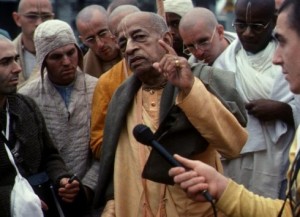Hare Krishna
25th August, 2015. Gurgaon
nirjana-vane kuṭira kari’ tulasī sevana
rātri-dine tina lakṣa nāma-saṅkīrtana (cc Antya 3.100)
Translation
Haridāsa Ṭhākura constructed a cottage in a solitary forest. There he planted a tulasī plant, and in front of the tulasī he would chant the holy name of the Lord 300,000 times daily. He chanted throughout the entire day and night.
Srila Prabhupada writes in his purport :
Haridāsa Ṭhākura, being the ācārya of chanting the Hare Kṛṣṇa mahā-mantra, is called Nāmācārya Haridāsa Ṭhākura. From his personal example we can understand that chanting the Hare Kṛṣṇa mantra and becoming highly elevated in Kṛṣṇa consciousness is very simple. Without difficulty one can sit down anywhere, especially on the bank of the Ganges, Yamunā or any other sacred river, devise a sitting place or cottage, plant a tulasī tree, and before the tulasī chant the Hare Kṛṣṇa mahā-mantra undisturbed.
Haridāsa Ṭhākura used to chant the holy name on his beads 300,000 times daily. Throughout the entire day and night, he would chant the sixteen names of the Hare Kṛṣṇa mahā-mantra. One should not, however, imitate Haridāsa Ṭhākura, for no one else can chant the holy name 300,000 times a day. Such chanting is for the mukta-puruṣa, or liberated soul. We can follow his example, however, by chanting sixteen rounds of the Hare Kṛṣṇa mahā-mantra on beads every day and offering respect to the tulasī plant. This is not at all difficult for anyone, and the process of chanting the Hare Kṛṣṇa mahā-mantra with a vow before the tulasī plant has such great spiritual potency that simply by doing this one can become spiritually strong. Therefore we request the members of the Hare Kṛṣṇa movement to follow Haridāsa Ṭhākura’s example rigidly. Chanting sixteen rounds does not take much time, nor is offering respects to the tulasī plant difficult. The process has immense spiritual potency. One should not miss this opportunity.
There have been some small realisations in my brief spiritual journey but nothing compares to what mercy and reciprocation which any fallen soul could have imagined to receive from Tulasi Maharani. Serving her seems to like a direct service in the spiritual world. It has been an amazing journey for me.
Few months back I saw Vrinda Devi’s picture in the room of HG Srimati Mataji. After the class I gathered some courage and uttered how I share a special bond with the same deity of Vrinda Devi. I then hesitatingly asked Mataji what can I do to please her. Srimati Mataji’s impromptu and immediate reply- sing Vrinda ashtakam daily. Happy with her instruction, I came back home and searched for the same over internet. I had never heard it before and found that it was written by, no surprise here, Srila Visvanatha Cakravarti Thakura. Then I searched again to find in what tune to sing it, in what looked difficult words to me. From that day onward I am singing it daily to her. I liked the very first tune I heard, below is the video of the same.
Amazingly within a few weeks of singing Vrinda Ashtakam a merciful devotee brought her framed picture for our Altar when they visited Vrinda Devi temple in Nandagaon (Vrindavana). And it was the perfect size for my altar, I was simply over the moon!
Here is the Sri Vrinda Devi Ashtakam which I request all sincere devotees to kindly sing daily for the pleasure of Tulasi Maharani. We can then pray her sincerely to please inspire us in our heart on how to serve her properly and then wait for the magical reciprocation!
Sri Vrinda Devi Ashtakam
gangeya-campeya-tadit-vinindi-
rocih-pravaha-snapitatma-vrnde
bandhuka-bandhu-dyuti-divya-vasu
vrnde namas te caranaravindam
You are bathed by streams of splendor that rebuke gold, lightning, and the campaka flower. Your splendid garments are friend to the bandhuka flower. O Vrnda, I bow to your lotus feet.
bimbadharoditvara-manda-hasya-
nasagra-mukta-dyuti-dipitasye
vicitra-ratnabharana-sriyadhye
vrnde namas te caranaravindam
Your face is splendid with a pearl decorating the tip of Your nose and a wonderful gentle smile on Your bimba-fruit lips. You are decorated with wonderful jewel ornaments. O Vrnda, I bow to your lotus feet.
samasta-vaikuntha-siromanau sri
krishnasya vrndavana-dhanya-dhamni
dattadhikare vrsabhanu-putrya
vrnde namas te caranaravindam
Vrsabhanu’s daughter Radha made you guardian of Krishna’s opulent and auspicious abode of Vrndavana, the crest jewel of all Vaikuntha planets. O Vrnda, I bow to your lotus feet.
tvad-ajnaya pallava-puspa-bhrnga-
mrgadibhir madhava-keli-kunjah
madhv-adibhir bhanti vibhusyamana
vrnde namas te caranaravindam
By Your order the groves where Madhava enjoys pastimes are splendidly decorated with blossoming flowers, bumble-bees, deer, honey, and other things. O Vrnda, I bow to your lotus feet.
tvadiya-dutyena nikunja-yunor
atyutkayoh keli-vilasa-siddhih
tvat-saubhagam kena nirucyatam tad
vrnde namas te caranaravindam
Because you became Their messenger the eager and youthful divine couple enjoyed the perfection of transcendental pastimes in the forest. O Vrnda, I bow to your lotus feet.
rasabhilaso vasatis ca vrnda-
vane tvad-isanghri-saroja-seva
labhya ca pumsam krpaya tavaiva
vrnde namas te caranaravindam
By your mercy people attain residence in Vrndavana, the desire to serve your masters’ lotus feet, and the desire to assist in the rasa dance. O Vrnda, I bow to your lotus feet.
tvam kirtyase satvata-tantra-vidbhir
lilabhidhana kila krishna-saktih
tavaiva murtis tulasi nr-loke
vrnde namas te caranaravindam
They who are learned in the Satvata-tantra glorify you. You are Krishna’s pastime-potency. The Tulasi plant is your form in the world of men. O Vrnda, I bow to your lotus feet.
bhaktya vihina aparadha-laksaih
ksiptas ca kamadi-taranga-madhye
krpamayi tvam saranam prapanna
vrnde namas te caranaravindam
O merciful one, I have no devotion and have committed millions of offenses. I am drowning in the turbulent ocean of lust. Thus I take shelter of you. O Vrinda, I bow to your lotus feet.
vrndastakam yah srnuyat pathed va
vrndavanadhisa-padabja-bhrngah
sa prapya vrndavana-nitya-vasam
tat-prema-sevam labhate krtarthah
A person who is like a bumblebee at the lotus feet of Vrindavana’s king and queen, and who reads or hears this Vrindastaka, will eternally reside in Vrindavana and attain loving service to the divine couple.

( Tulasi Maharani at our humble home)
Srila Prabhupada: I am so very glad to learn that Srimati Tulasi Devi has favored you so much. If you can actually grow this Tulasi plant, and I am sure you will do it, then you must know it for certain that your devotion for Krsna is testified. I was very much anxious to introduce this worship of Tulasi plant amongst our Society members, but it has not become successful til now, therefore, when I hear that you have got this opportunity, my pleasure does not have any bounds. (Letter to Govinda — Los Angeles 7 April, 1970)
All glories to Vrinda Devi, Tulasi Maharani.
All glories to Srila Prabhupada.
All glories to Sri Guru and Gauranga.

